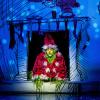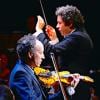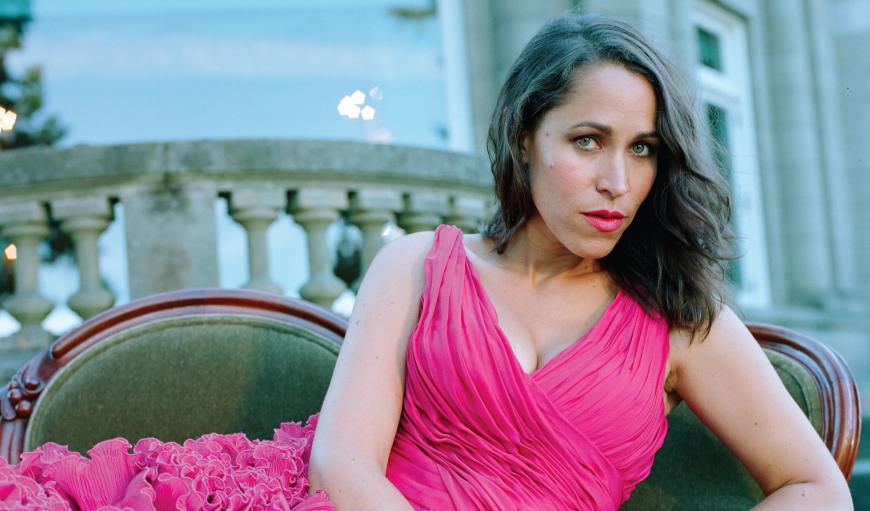
On the cusp of celebrating 30 years, the uber-hip pop orchestra Pink Martini, founded by Thomas M. Lauderdale in 1994, continues its annual tradition of performing two eclectic programs on New Year’s Eve at Walt Disney Concert Hall. Indeed, when the clock strikes midnight on Jan. 1, 2024, the band, in its eighth end-of-year appearance at the venue, will once again feature lead singer and songwriter China Forbes, who will continue the festivities by crooning the iconic Scottish number “Auld Lang Syne.”
As another year comes to a close, Forbes, who was born and raised in Cambridge, Massachusetts, where she graduated cum laude from Harvard University and was awarded the Jonathan Levy Prize for acting, is as upbeat as ever at age 53. And while her path to Pink Martini-dom was fairly straightforward, she did have a brief stint as an actress, appearing in New York regional theater and off-off Broadway productions. She also formed and sang with her first band back then, regularly appearing at city hot spots including CBGB’s Gallery and Mercury Lounge.
But in 1995, Lauderdale, a classically trained pianist and classmate at Harvard, asked her to sing with his recently formed group, and the rest is history.
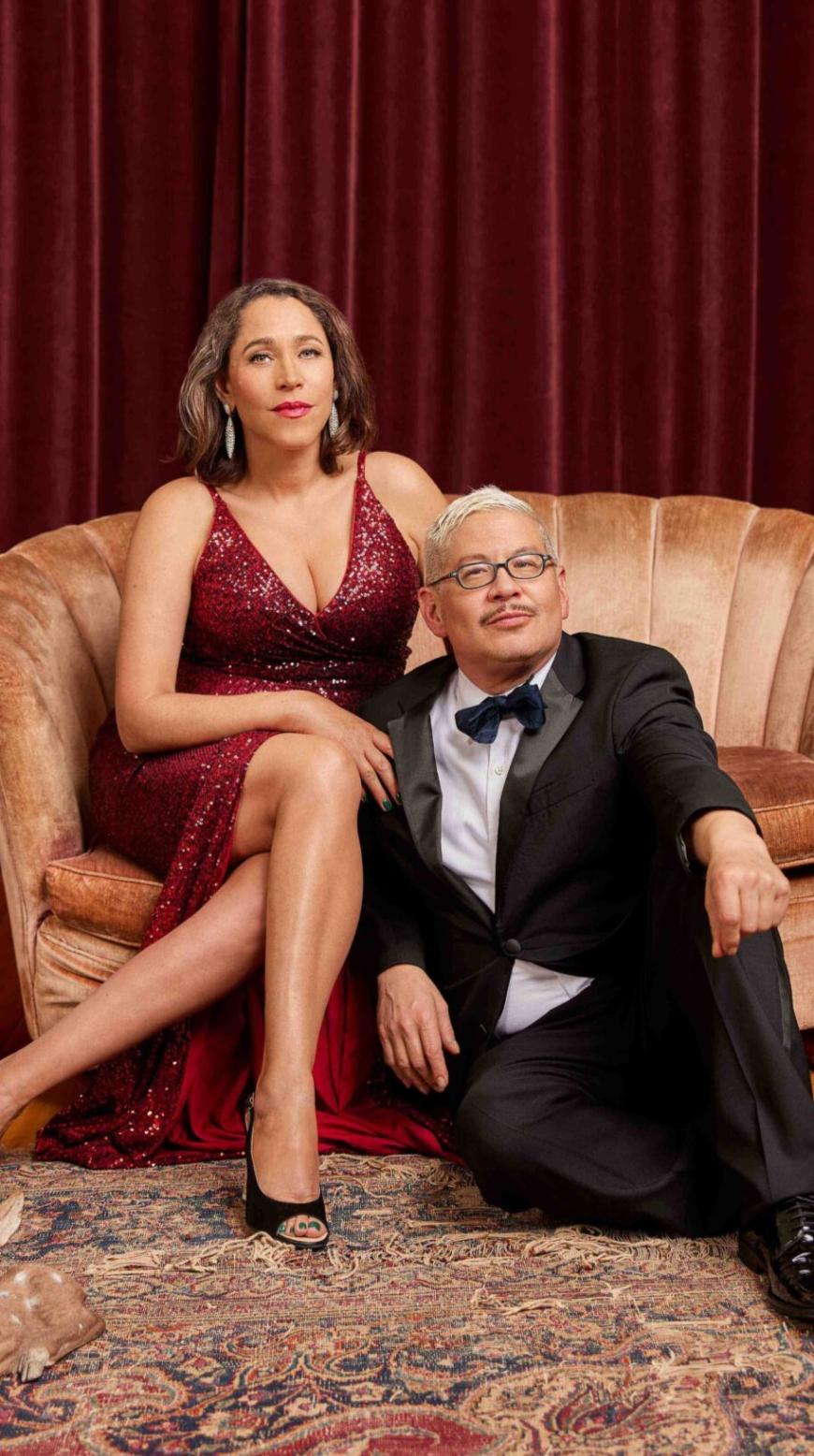
Pink Martini’s mix of Brazilian samba and the party sounds of 1930s Cuban dance music, all wrapped up with a bow of Parisian cafe cool, has led to sold-out shows all over the world, from Carnegie Hall to the Royal Albert Hall to Paris’s legendary L’Olympia theater. In addition, the ensemble has gigged at the Hollywood Bowl and was inducted into the Hollywood Bowl Hall of Fame in 2014.
Then there’s Pink Martini’s discography. Forming its own label, Heinz Records, in 1997, the group has since sold more than 3 million albums worldwide, with its debut, Sympathique, becoming an international phenomenon, earning the group nominations for Song of the Year and Best New Artist in France’s Victoires de la Musique Awards in 2000.
The Portland, Oregon-based Forbes, who snagged the Ella Fitzgerald Award at the Montreal International Jazz Festival last year, has also co-composed, with bandleader Lauderdale, many of the group’s most popular songs, including “Sympathique,” “Over the Valley,” and “A Snowglobe Christmas.” On her own, she’s penned “Hey Eugene,” the title track of the group’s third album, which debuted at No. 1 on Amazon’s best sellers list in 2007, and has also released two solo albums, including Love Handle (1995), with her next coming in 2024.
SF Classical Voice spoke with Forbes by phone from San Francisco, where Pink Martini was doing a run of shows at SFJAZZ. The chanteuse was keen on talking about the band, its numerous collaborations, and her songwriting process, among other topics.
How would you describe Pink Martini’s aesthetic, and who came up with the name?
Elegant, old-fashioned, glamorous, romantic, but also with humor. We can’t help but have that humor. Thomas came up with the name early on, when he needed a name at a fundraiser he was playing. He always loved the film Breakfast at Tiffany’s because he loved Henry Mancini and The Pink Panther and all of that cocktail aesthetic. He was taken with that and thought [the words] “pink” and “martini” sounded good together.
Your New Year’s Eve concerts at Disney Hall have become a tradition. How many musicians will be there, and how do you decide on a set list?
I love Disney Hall so much. I feel so privileged to be inside the boundary of that building. We were there for the inauguration of the hall, and for the 100th anniversary of the LA Phil, we were playing outside.
[As for musicians], we never really know how many there will be because Thomas could add a whole string section at the last minute or add some guest musicians. Normally, there are about 13 of us, but it [tends to] get bigger and bigger.
Our concerts in December are mostly holiday, and New Year’s Eve is a transition back, with some holiday songs, but it’s less Christmas-oriented. We always do “Auld Lang Syne,” a samba version in Scottish, English, Arabic, and French.
Speaking of languages, how easy or hard is it to sing in some 25 languages, including Turkish, Croatian, Japanese, Greek, Portuguese, and Spanish — with The New York Times once saying you were “channeling Edith Piaf” when you sang in French?
It’s become so natural to me. I studied French and Italian, but singing in those [other] languages, it became a fun challenge. I was much better when I was younger, memorizing lyrics in different languages. Most of the time I learn phonetically and know what the gist of my phrases mean and can deliver the story and emotions in the songs.
Pink Martini has almost a dozen albums out, including collaborations, with you and Thomas writing many of the group’s songs. You’ve released two solo albums as well. What is your process?
My third solo album, The Road, will be released in May. It’s exciting, and I’ve worked on it for a long time. [There are] a few singles, [such as] “Full Circle,” that I wrote and released during the pandemic. It’s definitely a song of hope, a song about life, being OK with the hard times of life. It’s also [about] how they give way to the good times.
One woman wrote a note to me: “It’s a song that can mend anything that’s broken, but it has something about it that makes people cry.” That makes me happy; I love [that my music can let] people cry. Another song, “Rise,” I wrote in reaction to the suicide of a bandmate, [percussionist] Derek Rieth. He died in 2014, and the song was inspired by some things I said to him when he was struggling with depression. After he died, I felt this song needed to be released to help other people.
My songs are kind of heavy. [They’re about] divorce, postpartum depression, middle age. The one about middle age, “Twinkling Lights,” is about figuring out a way to be happy with where you are and who you are, [but] it’s not a sad song. “The Road” is about trying to figure out who you are. I started the song when I was 35, and it’s based on Erik Satie’s Gymnopédie No. 1.
It all originates with piano and vocals. I fill them out from there. I have strings on a few songs, also some horns; I sort of just added what I felt it needed. … [This album is] kind of spare [because] I didn’t want it to be overproduced.
My process varies. [Sometimes] something happening in my life totally inspires the lyrics first, and then I figure out the melody. Sometimes I sit at the piano and play a chord progression, and [a song] might come out.
“Hey Eugene” was about a boy I met at a party. He asked me for my number, and he didn’t call. While I was waiting, I became incredulous, and then I wrote the song. It’s a run-on sentence about what happened [and was] inspired by Suzanne Vega.
My process is being in the moment and noticing what’s there, someone saying something, and I write it down. I see where the songs are, and I grab them. Other people don’t notice the poetry that’s right there, but I’m sensitive to that.
I can relate. Now, China, this gal wants to know what kinds of gowns are in your closet.
Oh my god — too many to fit in one closet. You will find green metallic, drapey gowns, pink and magenta, cabbage-flower-cluster ball gowns. You will find sequins. I love sparkling black sequins, multicolored striped sequins. You will find velvet. I have a beautiful shawl from my great-grandmother from 1920. It’s dark green and black tie-dyed silk velvet. It was in perfect condition until I wore it to a “women in theater” event and they slapped a name tag on it. I don’t see how anyone can repair that. I suppose I could put a brooch on it and keep wearing it.
Pink Martini has also collaborated with a roster of boldface names, including Rufus Wainwright, Jimmy Scott, Carol Channing, and the list goes on.
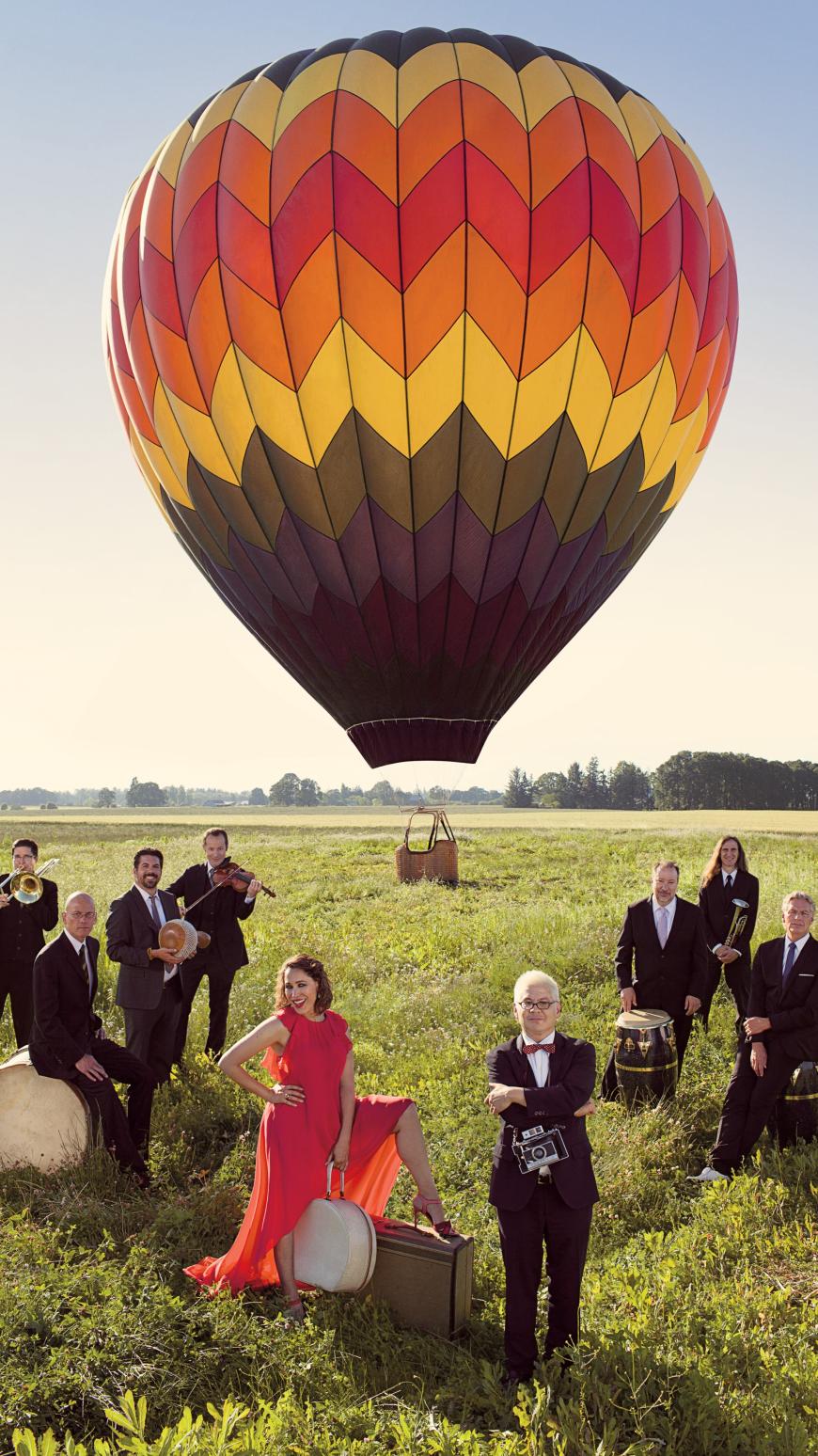
Jimmy Scott. It was amazing to hear his voice. He’s so unparalleled. I never heard anything like it. He was very old when we worked together and wasn’t as aware as he would have been earlier. We did “Tea for Two” with him on our third record, Hey Eugene!
Carol Channing. It was incredible to see a performer so seasoned go out onstage and have the charisma and the humor she had. The voice was just the same, [but] it was weird to see that in person. We also performed with Henri Salvador. He was like the Nat King Cole of France. Thomas tracked him down because we’d already recorded one of his songs, “Syracuse.” We met him as he was getting out of a taxi and we were getting in, and Thomas got him to perform with us at the Hollywood Bowl.
What’s your practice regimen like?
I do a 20-minute vocal warm-up and play piano and practice my songs all the time. I feel when I do this for a warm-up, it makes quite a difference. I’m always working on my voice and trying to improve. When I started out, I hadn’t trained as a singer. I was always self-taught. After vocal surgery for a polyp [in 2011], I took lessons for 10 years and studied opera. The arias I love are by Puccini and Verdi, but it’s too late for me to become an opera singer. I just sing opera anyway, and that’s it.
Where do you see yourself in the next five to 10 years?
I want to still be performing but not as much. I like traveling, learning new things, and having new challenges. Touring keeps me connected to all of that. But I hope I see myself at home more with my 14-year-old son, boyfriend, and two cats, making music, scoring films, not touring as much but constantly writing songs and recording.
I’m a Taurus, an earth sign, a homebody who wants to sleep under a tree like Ferdinand [the bull]. Last year we were on the road for six months, even though they were broken-up trips. But being on the road, I just feel like my life is in conflict with my nature. Now that I finished the [solo] album, I can think about other projects again.
I also hope I’ll have written a musical by then. I have an outline and songs and a plot. It’s the story of my life, so I know what the plot is. I’ve said it before, but I feel like I’m getting revved up about it. I couldn’t get it finished before because I was never home.


